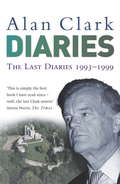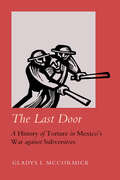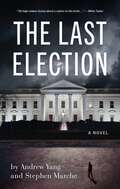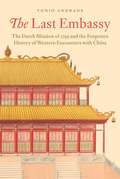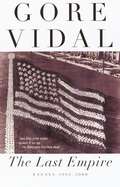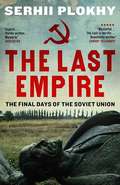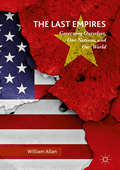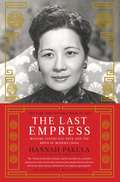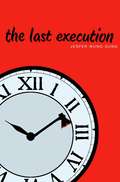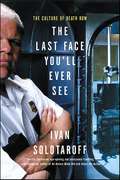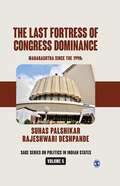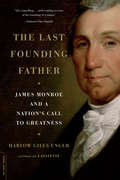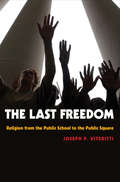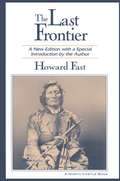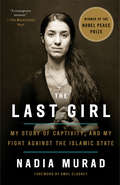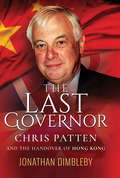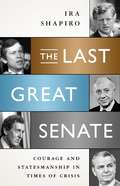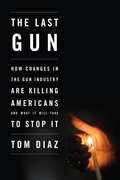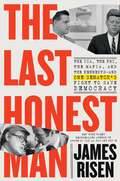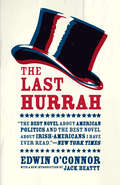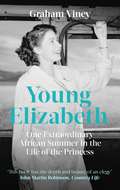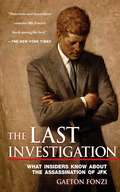- Table View
- List View
The Last Diaries: In and Out of the Wilderness
by Alan Clark'With his Diaries, he has written himself into the life of our times with a panache and candour that ranks him next to Boswell or Pepys' The TimesThe first two volumes of Alan Clark's were irresistible, irreverent, infamous, outrageous. This last volume is a fitting finale to the work of a man who has been described as 'the best diarist of his century'. The third volume begins in 1991 with Alan Clark contemplating quitting as an MP. Life at Saltwood Castle, his home, hangs heavy; then comes the Scott inquiry and the Matrix Churchill affair. Publication of the first volume of the Diaries leads 'the coven', a family of former girlfriends, to sell their story to the NEWS OF THE WORLD. This volume follows his attempts to return to Westminster, an affair that threatens his marriage, and closes with the tragedy of his final months when he is diagnosed with a brain tumour, but keeps his diary until he can no longer focus on the page.
The Last Diaries: In and Out of the Wilderness
by Alan Clark'With his Diaries, he has written himself into the life of our times with a panache and candour that ranks him next to Boswell or Pepys' The TimesThe first two volumes of Alan Clark's were irresistible, irreverent, infamous, outrageous. This last volume is a fitting finale to the work of a man who has been described as 'the best diarist of his century'. The third volume begins in 1991 with Alan Clark contemplating quitting as an MP. Life at Saltwood Castle, his home, hangs heavy; then comes the Scott inquiry and the Matrix Churchill affair. Publication of the first volume of the Diaries leads 'the coven', a family of former girlfriends, to sell their story to the NEWS OF THE WORLD. This volume follows his attempts to return to Westminster, an affair that threatens his marriage, and closes with the tragedy of his final months when he is diagnosed with a brain tumour, but keeps his diary until he can no longer focus on the page.
The Last Door: A History of Torture in Mexico's War against Subversives (Violence in Latin American History)
by Gladys I. McCormickAs guerrilla groups sprouted up across Mexico in the early 1970s, the military and police routinely resorted to extreme acts of violence, including the systematic use of torture. In The Last Door, Gladys McCormick provides the most thorough account of how torture became a crucial and routine practice of the Mexican government’s war against subversives. Drawing from extensive oral history interviews and declassified government documents, McCormick describes experiences of arrest, torture, and detention in which forced disappearances became all too common and advocates for justice rallied around political prisoners. Torture was not always about extracting information; it was also about inflicting punishment on a faceless so-called enemy and instilling terror into advocates of social change. As McCormick argues, torture became a quotidian practice of state making in Mexico during the 1970s, leaving individuals and their families forever changed. The lack of repercussions for government officials notorious for employing torture, even in spite of a growing movement for truth and justice, has led to entrenched impunity that is endemic in Mexico as its contemporary security crisis continues.
The Last Election
by Stephen Marche Andrew YangA gripping, intricately plotted political thriller set on the campaign trail of the USA’s next—and because of crucial flaws in the electoral system—its last election; from former presidential candidate Andrew Yang and author Stephen Marche THE LAST ELECTION is a unique political thriller about an outlandish yet frighteningly possible—even probable—scenario in America’s near future, during the crucial 2024 presidential election. Though it is fiction, it is informed by Andrew Yang’s insider’s view from his run deep into the Democratic primaries in 2020. It is also a wake-up call to an America tearing itself apart. The story focuses on two characters: Mikey Ricci, a political operative who has lost faith in the system, and Martha Kass, a journalist for the New York Times. In 2023, Ricci becomes the campaign manager of a third-party candidate who runs on a popular, centrist platform and whose frank and honest manner begins to gain ground. As it begins to appear that Ricci’s candidate might win enough electoral votes to upset the delicate balance of America’s two-party system, Kass stumbles upon a plot by the current Joint Chiefs of Staff to seize power in the anticipated chaos of the coming election. Events unfold at the frenetic pace of the campaign trail, and as the electoral totals are tallied, it becomes more and more evident that no one will accrue the coveted majority of 270 electoral votes. If this happens, who wins? Will the electoral system collapse? What is Congress’s role in certification, and how will congressional leaders behave with their unprecedented individual power? Will the American experiment end?
The Last Embassy: The Dutch Mission of 1795 and the Forgotten History of Western Encounters with China
by Tonio AndradeFrom the acclaimed author of The Gunpowder Age, a book that casts new light on the history of China and the West at the turn of the nineteenth centuryGeorge Macartney's disastrous 1793 mission to China plays a central role in the prevailing narrative of modern Sino-European relations. Summarily dismissed by the Qing court, Macartney failed in nearly all of his objectives, perhaps setting the stage for the Opium Wars of the nineteenth century and the mistrust that still marks the relationship today. But not all European encounters with China were disastrous. The Last Embassy tells the story of the Dutch mission of 1795, bringing to light a dramatic but little-known episode that transforms our understanding of the history of China and the West.Drawing on a wealth of archival material, Tonio Andrade paints a panoramic and multifaceted portrait of an age marked by intrigues and war. China was on the brink of rebellion. In Europe, French armies were invading Holland. Enduring a harrowing voyage, the Dutch mission was to be the last European diplomatic delegation ever received in the traditional Chinese court. Andrade shows how, in contrast to the British emissaries, the Dutch were men with deep knowledge of Asia who respected regional diplomatic norms and were committed to understanding China on its own terms.Beautifully illustrated with sketches and paintings by Chinese and European artists, The Last Embassy suggests that the Qing court, often mischaracterized as arrogant and narrow-minded, was in fact open, flexible, curious, and cosmopolitan.
The Last Empire: Essays 1992-2000
by Gore VidalA new collection of provocative, witty and eloquent essays by Gore Vidal, the greatest living American man of letters and one of the finest essayists of the twentieth (and twenty-first) century. The Last Empire is Gore Vidal's ninth collection of essays in the course of his distinguished literary career.
The Last Empire: The Final Days of the Soviet Union
by Serhii PlokhyBY THE AUTHOR OF CHERNOBYL: HISTORY OF A TRAGEDY, WINNER OF THE BAILLIE GIFFORD PRIZE 2018 WINNER OF THE PUSHKIN HOUSE RUSSIAN BOOK PRIZE 2015 On Christmas Day 1991 Mikhail Gorbachev resigned as president of the Soviet Union. By the next day the USSR was officially no more and the USA had emerged as the world&’s sole superpower. Award-winning historian Serhii Plokhy presents a page-turning account of the preceding five months of drama, filled with failed coups d&’état and political intrigue. Honing in on this previously disregarded but crucial period and using recently declassified documents and original interviews with key participants, he shatters the established myths of 1991 and presents a bold new interpretation of the Soviet Union&’s final months. Plokhy argues that contrary to the triumphalist Western narrative, George H. W. Bush desperately wanted to preserve the Soviet Union and keep Gorbachev in power, and that it was Ukraine and not the US that played the key role in the collapse of the Soviet Union. The consequences of those five months and the myth-making that has since surrounded them are still being felt in Crimea, Russia, the US, and Europe today. With its spellbinding narrative and strikingly fresh perspective, The Last Empire is the essential account of one of the most important watershed periods in world history, and is indispensable reading for anyone seeking to make sense of international politics today.
The Last Empires
by William AllanThis book is a forthright and novel examination of efforts to improve global governance over the last forty years. It looks at the effects of governance changes on people that have been marginalized by industrial progress and international conflict and the inability of national governments to meet the needs of global society. Economics has long laid claims to providing the basis for global prosperity, but this promise has all to frequently been broken. Michel Foucault looked closely at economics and neoliberalism as a possible means for guiding modern governments to allow individuals to govern themselves and others. He focused on the evolution of social development as a consequence of many disciplines and biopolitical forces, but he never looked at his data from the perspective of economics alone. This book offers a Foucauldian interpretation of contemporary governance issues, such as global security, social cohesion, economic crisis and financialization, to the formidable problems that the world faces at the beginning of the 21st century.
The Last Empress: Madame Chiang Kai-shek and the Birth of Modern China
by Hannah PakulaWith the beautiful, powerful, and sexy Madame Chiang Kai-shek at the center of one of the great dramas of the twentieth century, this is the story of the founding of modern China, starting with a revolution that swept away more than 2,000 years of monarchy, followed by World War II, and ending in the eventual loss to the Communists and exile in Taiwan. An epic historical tapestry, this wonderfully wrought narrative brings to life what Americans should know about China -- the superpower we are inextricably linked with -- the way its people think and their code of behavior, both vastly different from our own. The story revolves around this fascinating woman and her family: her father, a peasant who raised himself into Shanghai society and sent his daughters to college in America in a day when Chinese women were kept purposefully uneducated; her mother, an unlikely Methodist from the Mandarin class; her husband, a military leader and dogmatic warlord; her sisters, one married to Sun Yat-sen, the George Washington of China, the other to a seventy-fifth lineal descendant of Confucius; and her older brother, a financial genius. This was the Soong family, which, along with their partners in marriage, was largely responsible for dragging China into the twentieth century. Brilliantly narrated, this fierce and bloody drama also includes U. S. Army General Joseph Stilwell; Claire Chennault, head of the Flying Tigers; Communist leaders Mao Tse-tung and Chou En-lai; murderous warlords; journalists Henry Luce, Theodore White, and Edgar Snow; and the unfortunate State Department officials who would be purged for predicting (correctly) the Communist victory in the Chinese Civil War. As the representative of an Eastern ally in the West, Madame Chiang was befriended -- before being rejected -- by the Roosevelts, stayed in the White House for long periods during World War II, and charmed the U. S. Congress into giving China billions of dollars. Although she was dubbed the Dragon Lady in some quarters, she was an icon to her people and is certainly one of the most remarkable women of the twentieth century.
The Last Execution
by Jesper Wung-Sung Lindy Falk van RooyenBased on the chilling true story of the last execution in Denmark's history, this award-winning, mesmerizing novel asks a question that plagues a small Danish town: does a fifteen-year-old boy deserve to be put to death?On February 22, 1853, a fifteen-year-old Niels Nelson is prepared to be executed on Gallows Hill. The master carpenter comes to measure Niels for his coffin. The master baker bakes bread for the spectators. The messenger posts the notice of execution in the town square. The poet prepares his best pen to record the events as they unfold. A fly, Niels's only companion in the cell, buzzes. A dog hovers by his young master's window. A young girl hovers too, pitying the boy. The executioner sharpens his blade. This remarkable, wrenching story is told with the alternating perspectives of eleven different bystanders--one per hour--as the clock ticks ever closer to the moment when the boy must face his fate. Niels Nielson, a young peasant, was sentenced to death by beheading on the dubious charges of arson and murder. Does he have the right to live despite what he is accused of? That is the question the townsfolk ask as the countdown begins. With strong social conscience, piercing intellect, and masterful storytelling, Jesper Wung-Sung explores the age-old question: who determines who has the right to live or die?
The Last Face You'll Ever See: The Culture of Death Row
by Ivan SolotaroffIn fascinating detail, Ivan Solotaroff introduces us to the men who carry out executions. Although the emphasis is on the personal lives of these men and of those they have to put to death, The Last Face You'll Ever See also addresses some of the deeper issues of the death penalty and connects the veiled, elusive figure of the executioner to the vast majority of Americans who, since 1977, have claimed to support executions. Why do we do it? Or, more exactly, why do we want to?The Last Face You'll Ever See is not about the polarizing issues of the death penalty -- it is a firsthand report about the culture of executions: the executioners, the death-row inmates, and everyone involved in the act. An engrossing, unsettling, and provocative book, this work will forever affect anyone who reads it.
The Last Fortress of Congress Dominance: Maharashtra Since the 1990s (SAGE Series on Politics in Indian States)
by Suhas Palshikar Rajeshwari DeshpandeFocused mainly on Maharashtra’s politics since the 1990s, The Last Fortress of Congress Dominance also provides its readers a clear view of the historical context and the socio-political forces that have dominated the state since the 1950s. The politics of Maharashtra has been woven around two key factors: the Congress party and the Marathas. Attempts by the Shiv Sena and the BJP to emerge as alternatives to the Congress have had only limited success so far. As the state politics witnesses the transition into a new party system, the book presents a detailed study on the party system of Maharashtra and situates the analysis in the broader context of crisis of the Marathas and the many distortions of the state’s political economy. Aided by rich survey data from the National Election Studies, for all elections since 1996, the book presents a long-term view of the politics of Maharashtra as the state completes 60 years of its existence.
The Last Founding Father: James Monroe and a Nation's Call to Greatness
by Harlow Giles UngerIn This Cripping Biography, award-winning author Harlow Giles Unger reveals the epic story of James Monroe (1758-1831)-the last of America's Founding Fathers-who transformed a small, fragile nation beset by enemies into a powerful empire stretching "from sea to shining sea." Emerging from the battlefields of the Revolutionary War a decorated soldier, Monroe went on to serve America as its first full-time politician-a member of Congress, minister to France and Britain, governor of Virginia, secretary of state, secretary of war, and, finally, fifth president of the United States. Monroe took command of a nation nearly bankrupt, its people divided, its borders under attack, and its capital in ashes after the British invasion in the War of 1812. During two formative terms he rebuilt national defenses, expanded the military, extended national boundaries, and startled the world by proclaiming the landmark Monroe Doctrine, closing the Americas to foreign incursions and colonization. His leadership ushered in an "Era of Good Feelings" never seen before or since in American history. A superb read based on stellar scholarship, The Last Founding Father sheds light not only on the remarkable life of Monroe, but on a key chapter in the story of America. The result is an action-filled history in the grand tradition.
The Last Freedom: Religion from the Public School to the Public Square
by Joseph P. ViterittiThe presidency of George W. Bush has polarized the church-state debate as never before. The Far Right has been emboldened to use religion to govern, while the Far Left has redoubled its efforts to evict religion from public life entirely. Fewer people on the Right seem to respect the church-state separation, and fewer people on the Left seem to respect religion itself--still less its free exercise in any situation that is not absolutely private. In The Last Freedom, Joseph Viteritti argues that there is a basic tension between religion and democracy because religion often rejects compromise as a matter of principle while democracy requires compromise to thrive. In this readable, original, and provocative book, Viteritti argues that Americans must guard against debasing politics with either antireligious bigotry or religious zealotry. Drawing on politics, history, and law, he defines a new approach to the church-state question that protects the religious and the secular alike. Challenging much conventional opinion, Viteritti argues that the courts have failed to adequately protect religious minorities, that the rights of the religious are under greater threat than those of the secular, and that democracy exacts greater compromises and sacrifices from the religious than it does from the secular. He takes up a wide range of controversies, including the pledge of allegiance, school prayer, school vouchers, evolution, abortion, stem-cell research, gay marriage, and religious displays on public property. A fresh and surprising approach to the church-state question, The Last Freedom is squarely aimed at the wide center of the public that is frustrated with the extremes of both the Left and the Right.
The Last Frontier: A New Edition With A Special Introduction By The Author
by Howard FastNorth Castle Books are designed to bring the global variety of knowledge to a broader audience. Primarily aimed at the general reader through bookstore distribution, North Castle Books makes available, in handsomely bound paper editions, titles of literary and cultural significance that our editors have found to be of lasting importance. Spanning the range of fields from Asian Studies to American Studies, from short stories to scholarly treatises, from myth to memoirs, from Economics to Government, from Russian Politics to Recent History, North Castle Books will occupy an important place on bookshelves. Each edition will be reasonably priced, affording students, scholars, and serious readers the means to expand their horizons and broaden their aesthetic understanding.The story of the Cheyenne Indians in the 1870s, and their bitter struggle to flee from the Indian Territory in Oklahoma back to their home in Wyoming and Montana."Mr. Fast's novel will stand or fall upon its value as a dramatic, finely presented story. It is all of that: a model, which may easily become a classic example, of what to put in and what to leave out in the writing of a historical novel. ... I do not believe it is saying too much to suggest that in the person of Mr. Fast we may have the next really important American historical novelist". -- Joseph Henry Jackson, New York Herald Tribune Books"Fast's writing, austerely polished and austerely poetic, is admirably suited to this epic tale of a desperate effort for dignified survival. ... Fast has gotten to the core of this incident and made it into a rich American novel". -- New York Times Book Review"An amazing restoration and reconstruction. Thecharacters breathe, the landscape is solid ground and sky, and the story runs flexibly along the zigzag trail of a people driven by a deep instinct to their ancient home. I do not know any other episode in Western history that has been so truly and subtly perpetuated as this one. A great story lost has been found again, and as here told promises to live for generations". -- Carl Van Doren
The Last Girl: My Story Of Captivity, And My Fight Against The Islamic State
by Amal Clooney Nadia MuradIn this intimate memoir of survival, a former captive of the Islamic State tells her harrowing and ultimately inspiring story. Nadia Murad was born and raised in Kocho, a small village of farmers and shepherds in northern Iraq. A member of the Yazidi community, she and her brothers and sisters lived a quiet life. Nadia had dreams of becoming a history teacher or opening her own beauty salon. On August 15th, 2014, when Nadia was just twenty-one years old, this life ended. <P><P>Islamic State militants massacred the people of her village, executing men who refused to convert to Islam and women too old to become sex slaves. Six of Nadia’s brothers were killed, and her mother soon after, their bodies swept into mass graves. Nadia was taken to Mosul and forced, along with thousands of other Yazidi girls, into the ISIS slave trade. <P><P> Nadia would be held captive by several militants and repeatedly raped and beaten. Finally, she managed a narrow escape through the streets of Mosul, finding shelter in the home of a Sunni Muslim family whose eldest son risked his life to smuggle her to safety. <P><P>Today, Nadia's story—as a witness to the Islamic State's brutality, a survivor of rape, a refugee, a Yazidi—has forced the world to pay attention to the ongoing genocide in Iraq. It is a call to action, a testament to the human will to survive, and a love letter to a lost country, a fragile community, and a family torn apart by war.
The Last Governor: Chris Patten and the Handover of Hong Kong
by Jonathan Dimbleby1 July 1997 marked the end of British rule of Hong Kong, whereby this territory was passed into the hands of the Peoples Republic of China.In 1992, Chris Patten, former chairman of the Conservative Party, was appointed Hong Kong's last governor, and was the man to oversee the handover ceremony of this former British colony.Within the last five years of British rule, acclaimed journalist Jonathan Dimbleby was given unique access to the governor which enabled him to document the twists and turns of such an extraordinary diplomatic, political and personal drama.As Governor, Patten encouraged the necessary expansion of Hong Kong's social welfare system, striving to reconcile the basic rights and freedom of over 6 million people with the unpredictable imperatives of Beijing.Drawing on the insights of a host of senior figures, the author places the crisis in both its human and historical contexts, and presents some startling arguments about the conduct of British foreign policy on Hong Kong before and during Patten's tenure.
The Last Great Senate
by Ira ShapiroJournalists have called the U.S. Senate an empty chamber; politicians have lamented that the institution is broken-yet the Senate was once capable of greatness. Senators of the 1960s and '70s overcame southern opposition to civil rights, passed Great Society legislation, and battled the executive branch on Vietnam, Watergate, and its abuses of power. The right's sweep of the 1980 elections shattered that Senate, leaving a diminished institution in its wake. Ira Shapiro spent 12 years working for Senators Gaylord Nelson, Abraham Ribicoff, Thomas Eagleton, Robert Byrd, and Jay Rockefeller. The Last Great Senate is his vivid portrait of the statesmen who helped steer America during the crisis years of the late 1970s, transcending partisanship and overcoming procedural roadblocks that have all but strangled the Senate since their departure. The Last Great Senate is necessary reading for all those who wonder how the Senate used to work and what happened to the world's greatest deliberative body.
The Last Great Senate
by Ira ShapiroJournalists have called the U. S. Senate an empty chamber; politicians have lamented that the institution is broken-yet the Senate was once capable of greatness. Senators of the 1960s and ’70s overcame southern opposition to civil rights, passed Great Society legislation, and battled the executive branch on Vietnam, Watergate, and its abuses of power. The right’s sweep of the 1980 elections shattered that Senate, leaving a diminished institution in its wake. Ira Shapiro spent 12 years working for Senators Gaylord Nelson, Abraham Ribicoff, Thomas Eagleton, Robert Byrd, and Jay Rockefeller. The Last Great Senate is his vivid portrait of the statesmen who helped steer America during the crisis years of the late 1970s, transcending partisanship and overcoming procedural roadblocks that have all but strangled the Senate since their departure. The Last Great Senate is necessary reading for all those who wonder how the Senate used to work and what happened to the world’s greatest deliberative body.
The Last Great Senate: Courage and Statesmanship in Times of Crisis
by Ira Shapiro"The Last Great Senate" is Shapiro's vivid portrait of the statesmen who helped steer America during the crisis years of the late 1970s, transcending partisanship and overcoming procedural roadblocks that have all but strangled the Senate since their departure.
The Last Gun
by Tom DiazNewtown, Connecticut. Aurora, Colorado. Both have entered our collective memory as sites of unimaginable heartbreak and mass slaughter perpetrated by lone gunmen. Meanwhile, cities such as Chicago and Washington, D.C., are dealing with the painful, everyday reality of record rates of gun-related deaths. By any account, gun violence in the United States has reached epidemic proportions.A widely respected activist and policy analyst--as well as a former gun enthusiast and an ex-member of the National Rifle Association--Tom Diaz presents a chilling, up-to-date survey of the changed landscape of gun manufacturing and marketing. The Last Gun explores how the gun industry and the nature of gun violence have changed, including the disturbing rise in military-grade gun models. But Diaz also argues that the once formidable gun lobby has become a "paper tiger," marshaling a range of evidence and case studies to make the case that now is the time for a renewed political effort to attack gun violence at its source--the guns themselves.In the aftermath of Newtown, a challenging national conversation lies ahead. The Last Gun is an indispensable guide to this debate, and essential reading for anyone who wants to understand how we can finally rid America's streets, schools, and homes of gun violence and prevent future Newtowns.
The Last Honest Man: The CIA, the FBI, the Mafia, and the Kennedys—and One Senator's Fight to Save Democracy
by James RisenIn this &“gripping . . . spectacular piece of reporting&” (Ken Burns), a Pulitzer Prize-winning journalist examines Senator Frank Church, the man at the center of numerous investigations into the abuses of power within the American government. For decades now, America&’s national security state has grown ever bigger, ever more secretive and powerful, and ever more abusive. Only once did someone manage to put a stop to any of it. Senator Frank Church of Idaho was an unlikely hero. He led congressional opposition to the Vietnam War and had become a scathing, radical critic of what he saw as American imperialism around the world. But he was still politically ambitious, privately yearning for acceptance from the foreign policy establishment that he hated and eager to run for president. Despite his flaws, Church would show historic strength in his greatest moment, when in the wake of Watergate he was suddenly tasked with investigating abuses of power in the intelligence community. The dark truths that Church exposed—from assassination plots by the CIA, to links between the Kennedy dynasty and the mafia, to the surveillance of civil rights activists by the NSA and FBI—would shake the nation to its core, and forever change the way that Americans thought about not only their government but also their ability to hold it accountable. Drawing upon hundreds of interviews, thousands of pages of recently declassified documents, and reams of unpublished letters, notes, and memoirs, some of which remain sensitive today, Pulitzer Prize–winning reporter James Risen tells the gripping, untold story of truth and integrity standing against unchecked power—and winning—in The Last Honest Man. An instant New York Times bestseller
The Last Hurrah: A Novel
by Edwin O'Connor Jack Beatty"We're living in a sensitive age, Cuke, and I'm not altogether sure you're fully attuned to it." So says Irish-American politician Frank Skeffington--a cynical, corrupt 1950s mayor, and also an old-school gentleman who looks after the constituents of his New England city and enjoys their unwavering loyalty in return. But in our age of dynasties, mercurial social sensitivities, and politicians making love to the camera, Skeffington might as well be talking to us.<P><P> Not quite a roman á clef of notorious Boston mayor James Michael Curley, The Last Hurrah tells the story of Skeffington's final campaign as witnessed through the eyes of his nephew, who learns a great deal about politics as he follows his uncle to fundraisers, wakes, and into smoke-filled rooms, ultimately coming--almost against his will--to admire the man. Adapted into a 1958 film starring Spencer Tracy and directed by John Ford (and which Curley tried to keep from being made), Edwin O'Connor's opus reveals politics as it really is, and big cities as they really were. An expansive, humorous novel offering deep insight into the Irish-American experience and the ever-changing nature of the political machine, The Last Hurrah reveals political truths still true today: what the cameras capture is just the smiling face of the sometimes sordid business of giving the people what they want.
The Last Hurrah: The 1947 Royal Tour of Southern Africa and the End of Empire
by Graham VineyYoung Elizabeth captures in vivid detail perhaps the single-most important formative experience in Queen Elizabeth's life, the 1947 royal tour of southern Africa with her parents King George VI, Queen Elizabeth and Princess Margaret, during which she celebrated her twenty-first birthday.The year of the royal tour of southern Africa, 1947, marked both the high-water mark of the British Empire and the very moment at which it began to unravel. Graham Viney has written an intimate, revealing portrait of the young princess on tour with her parents and sister, Princess Margaret, hard at work in the national interest, and succeeding triumphantly against all odds. In the words of Rian Malan, South African author of My Traitor's Heart, it is 'a story about a country teetering on the brink of convulsive change and yet almost united, at least for a moment, by love for a king and queen who weren't really ours.' The year 1947 was a pivotal moment not just in the history of the Union of South Africa, but of the British Empire itself. Later that same year India gained independence and just one year later the Afrikaner Nationalist victory in South Africa would lead inexorably to the Republic of South Africa in 1961 and its departure from the Commonwealth. The present Queen Elizabeth must have learned a great deal about statecraft from her father, and about duty, tact and hard work from both her parents in the course of this three-month tour, during which the then princess celebrated her twenty-first birthday. It was also the family's first real experience of multiculturalism. Graham Viney's book gives us an intimate and revealing portrait of the royal family, while also superbly capturing a moment in the life of a fractious, recently formed 'nation', before its descent into over four decades of darkness. The royal family travelled ceaselessly, from February to April, on a specially commissioned, white-and-gold train, meeting thousands of people at every stop along the way. The tour was a show of imperial solidarity and a recognition of South Africa's contribution to the Allied cause during the Second World War, specifically that of South African prime minister Jan Smuts, who had served in both British war cabinets.Young Elizabeth draws skilfully on many diverse sources, not least the Royal Archive at Windsor, and includes many photographs of the royal family not previously published, such as stills from film footage held by the South African National Film, Video and Sound Archives in Pretoria.
The Last Investigation: A Former Federal Investigator Reveals the Man behind the Conspiracy to Kill JFK
by Marie Fonzi Gaeton FonziGaeton Fonzi's masterful retelling of his work investigating the Kennedy assassination for two congressional committees is required reading for students of the assassination and the subsequent failure of the government to solve the crime. <P><P>His book is a compelling postmortem on the House Select Committee on Assassinations, as well as a riveting account of Fonzi's pursuit of leads indicating involvement in the assassination by officers of the Central Intelligence Agency.First released in 1993, The Last Investigation was a landmark book upon its release. More than merely an indictment of the Committee's work, Fonzi tells the story of the important leads he developed as an investigator, which sent him into the milieu of Kennedy-haters among anti-Castro exiles and CIA officers. In this highly readable book, the author follows the trail to formerly obscure CIA officers such as David Atlee Phillips and David Morales. New records declassified under the JFK Records Act have only added to the dark questions raised here.
